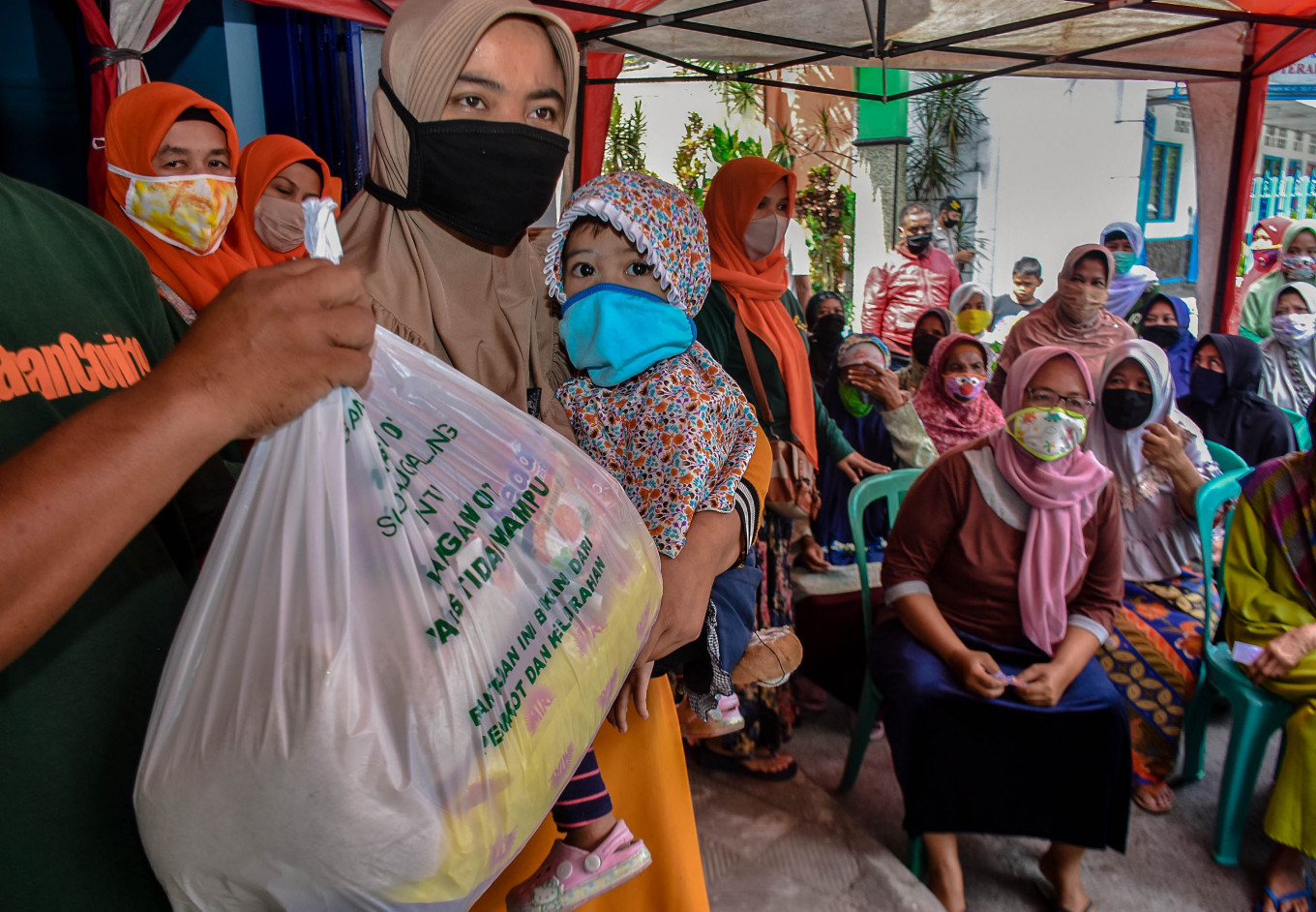Popular Reads
Top Results
Can't find what you're looking for?
View all search resultsPopular Reads
Top Results
Can't find what you're looking for?
View all search resultsGovt disburses 26% of pandemic stimulus, mostly to fund social aid programs
A total of Rp 695.2 trillion has been allocated in stimulus programs to strengthen the healthcare system and soften the economic impact of the coronavirus outbreak on the country.
Change text size
Gift Premium Articles
to Anyone
T
he government has spent Rp 183.5 trillion (US$12.6 billion), 26.4 percent, of the total budget for the COVID-19 response, mostly to fund social assistance programs.
A total of Rp 695.2 trillion has been allocated in stimulus programs to strengthen the healthcare system and soften the economic impact of the coronavirus outbreak on the country.
The government announced on Friday that spending on the social safety net reached Rp 95.57 trillion, almost 47 percent of the Rp 203.94 trillion allocation for such programs as the family hope and preemployment cards, as well as electricity subsidies for low-income households.
It also disbursed Rp 47.03 trillion, 38 percent, of the Rp 123.46 trillion stimulus budget for micro, small and medium enterprises (MSMEs) in the form of debt restructuring, interest rate subsidies and the newly launched productive cash transfer.
“The social safety net and [assistance for] MSMEs are the areas the President wants the task force to pay its utmost attention to,” Budi Gunadi Sadikin, the head of the economic recovery task force, said in a virtual press conference on Friday.
The government has been struggling to support low-income families and small businesses as the pandemic has hit economic activity. Indonesia’s economy shrank 5.32 percent in the second quarter as household spending and investment contracted sharply.
However, economists and businesspeople have criticized the slow disbursement of the stimulus funding, saying it risks a further slowing down of the economy.
“We hope in August or September the two new assistance programs, namely the productive social assistance program with a budget of Rp 22 trillion and the wage subsidy program with a budget of Rp 37.8 trillion, can be fully disbursed and thus help boost the economy in the third quarter,” said Budi, who also serves as deputy state-owned enterprises (SOEs) minister.
The government recently launched the productive social assistance and wage-subsidy programs to strengthen people’s purchasing power.
With a budget of Rp 22 trillion, the government is seeking to help 9.16 million micro MSMEs by providing a grant of Rp 2.4 million for each eligible business that has not been able to get loans from banks.
The government has disbursed 10.9 percent of the budget so far, supporting more than 1 million enterprises in the first week since its launch on Aug. 24.
As the pandemic has led to pay cuts and layoffs among tens of millions of workers, the government is also allocating Rp 37.8 trillion to help those earning less than Rp 5 million a month.
The government has disbursed 7.9 percent of the wage subsidy budget to 2.5 million eligible workers, aiming to cover 15.7 million workers eventually.
With new data provided to the government on unbankable MSMEs, Budi added that the government was planning to provide soft loans with zero percent interest rates for the first six months to further help the ailing businesses.
Budi also announced on Friday that Rp 12.24 trillion, almost 14 percent of the stimulus for the healthcare system, had been disbursed while Rp 11.43 trillion had been channeled to local administrations, ministries and institutions, less than 11 percent of the allocation.
The government has also disbursed Rp 17.23 trillion, 14.29 percent, of the business incentives stimulus, while none of the corporate financing funding has been disbursed to date.
Former finance minister Chatib Basri said in a webinar held by The Jakarta Post on Aug. 19 that the government would need to spend stimulus funds for social aid more quickly, adding that the funding would boost household demand, which was needed to revive the economy.
“The only spending that can achieve a significant level of absorption is social aid, not tax incentives,” he said.
“The government should focus on cash transfers and extend it to the middle class” rather than maintaining the current tax incentives, he went on to say. “If there is no economic activity and companies are running losses, they won't pay tax anyway.”










